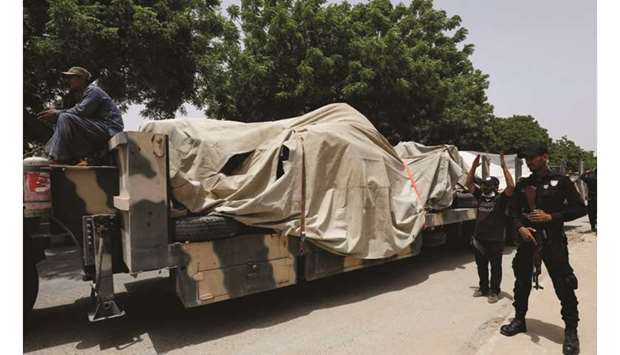Search teams have recovered the cockpit voice recorder from the wreckage of a Pakistan International Airline (PIA) airliner that crashed into a city neighbourhood last week, killing 97 people on board, a spokesman for the airline said.
The PIA Airbus A320 crashed on May 22 into a residential district of the port city of Karachi.
Two people on board survived.
Flight PK8303, from the eastern city of Lahore to Karachi, came down about a kilometre short of the runway as it was making a second attempt to land.
“The search resumed this morning and the voice recorder was found buried in the debris,” spokesman Abdullah H Khan said in a statement. “The cockpit voice recorder recovery will help a lot in the investigation.”
The flight data recorder had already been found.
Pakistani officials and Airbus investigators are collecting evidence at the site as they try to determine the cause of the country’s worst airline disaster in years.
Separately, the Airbus technical team said in a statement that the Pakistan authorities have requested them to decode the voice recorder.
“We have spoken to the Pakistani team about moving the voice recorder and flight recorder to France,” the statement said, adding that data from both will be decoded in France.
Under international aviation rules, French investigators from the BEA – the French air safety investigation authority for civil aviation – have joined the Pakistan-led probe because the 15-year-old Airbus jet was designed in France.
The BEA said in a statement the two recorders would be examined at its laboratory just outside Paris.
It issued a photograph of one of them on Twitter showing that it appeared to be intact inside its crash-resistant shell and metal base.
The plane’s CFM56 engines are expected to be a focus of the investigation after the pilot reported both had failed shortly after the plane made an initial, unsuccessful attempt to land.
The engines were made by CFM International, a joint-venture of France’s Safran and General Electric, and are among the most widely used and reliable in the airline industry.
Yesterday a government minister revealed that the captain of the airliner had approached Karachi airport without announcing that he could not open his landing gear and hit the runway three times.
Minister for Civil Aviation Ghulam Sarwar Khan told reporters that the plane’s engines touched the ground three times on the first attempt at landing.
“The pilot never announced his landing gear wasn’t opening. He haphazardly touched the engines thrice with the ground,” he said.
“All marks are present (on the runway). He was not at the proper height ... control tower informed him you aren’t at the required height, lower your altitude,” he said, adding that the pilot replied: “I will manage.”
Khan did not say how he knew the details of the conversation.
On Wednesday, the process of removing the wreckage of the plane from Karachi’s Model Colony started, with the exception of the airliner’s engine, landing gear, and avionics.
Removal of the wreckage commenced after clearance was received from the Airbus investigation team that had arrived in Karachi, after having collected crucial evidence from the crash site.
Trawlers, heavy machinery, and various other vehicles were being used to move the pieces – including its cabin and tail – of the crashed plane.
The engine, landing gear, and avionics were left behind until the Airbus team of experts completed their work.
The process was being monitored by the Pakistan Air Force (PAF), the Pakistan Civil Aviation Authority (PCAA), and the Pakistan International Airlines’ (PIA) engineering and technical ground support staff.
Soon after the crash last Friday, the authorities cordoned off the site and banned the transfer of objects from there until the Airbus team arrived to carry out a formal investigation into the incident.
The PK-8303 tragedy is the third most-catastrophic aviation disaster in the country’s history.

A police officer stands guard beside a truck loaded with the wreckage of the crashed Pakistan International Airlines’ PK8303 plane.
